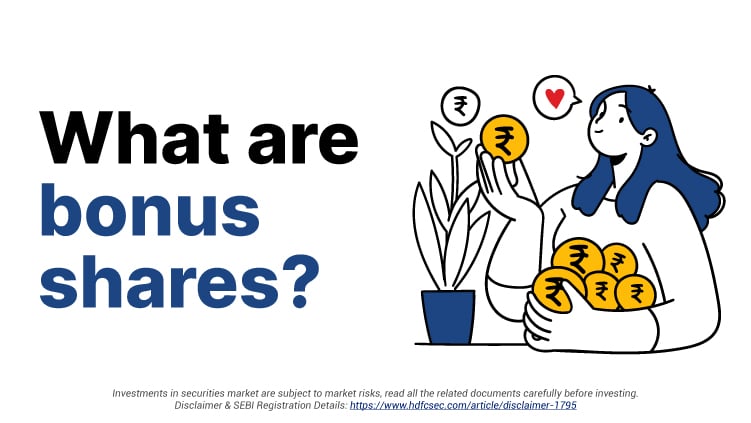What are Bonus Shares?
Investing in the stock market can earn you decent returns over the long term. If you are an equity shareholder of a company, you are part owner of it and are entitled to a portion of profits earned by the company.
Whether you want to receive the bonus shares or even want to place your trade, you will need a Demat account. For full-fledged broking, you can open a Demat account with HDFC Securities, and for discount broking, you can Open Demat Account with HDFC SKY.
Companies with strong financials reward their shareholders by distributing dividends or issuing bonus shares. In this blog, we will understand what are bonus shares, who are eligible for bonus shares, and what are the benefits of bonus issues.
Let’s begin with the bonus shares definition.
Bonus shares are the additional shares issued by the company to its existing shareholders for free, or without any additional costs. These shares are issued on the basis of the shares owned by the shareholders.
Companies earning huge profits or possessing a large amount of free reserves that can be utilised to distribute dividends, generally issue bonus shares to their existing shareholders on the basis of their existing stake in the company.
Why do companies issue bonus shares?
A company issues bonus shares to its shareholders when it faces a lack of funds despite earning decent profit for the period. In such a case, instead of paying dividends, the company opts for distributing bonus shares to existing shareholders in proportion to their existing shareholding.
If the company decides to issue bonus shares in the ratio of 1:2, an existing shareholder will receive two additional shares for each share held.
Bonus shares are given to the shareholders out of the profits and reserves of the company, and hence, this process is also known as capitalization of profits.
Eligibility for receiving bonus shares?
Companies announce the record date along with other details of the bonus issue. The shareholders who are registered owners of the company’s shares or have the company’s shares in their Demat account on the record date are only eligible to receive the bonus shares. In essence, a record date is a cut-off date set by the companies to know the list of eligible shareholders for the bonus issue.
It is also important to note that investors must purchase the shares of the company before the ex-date to be eligible for bonus issues. Ex-date is one day before the record. The T+2 settlement system for the delivery of shares is used in India. It means, if you purchase shares, it takes two days to get the ownership or credited to your demat account. Hence, the record date for determining the eligibility of bonus shares is two days behind the ex-date.
The company may take 15 days’ time to credit the bonus shares to the shareholders’ account after receiving a new ISIN (International Securities Identification Number) for the bonus shares.
Benefits of bonus shares
The company issues bonus shares to the shareholders for free in the ratio of their existing holding. This is a form of reward for shareholders in lieu of dividends. The investors get free shares which helps them in multiplying their investment in the long term.
Moreover, investors are not liable to pay any tax on the bonus shares issued to them.
Bonus shares also increase the number of outstanding shares of the company in the stock market which enhances the liquidity of the stock. Bonus issue also helps enhance the company’s image in the share market and improve the trust of the existing shareholders while attracting other investors.
The number of free-floating shares of a company increases in the stock market after it issues bonus shares. With additional shares, the price per share in the market decreases, which makes it affordable to more investors.
Related Posts
Don't miss another Article
Subscribe to our blog for free and get regular updates right into your inbox.
Categories
newsletter
 HSL Mobile App
HSL Mobile App 



